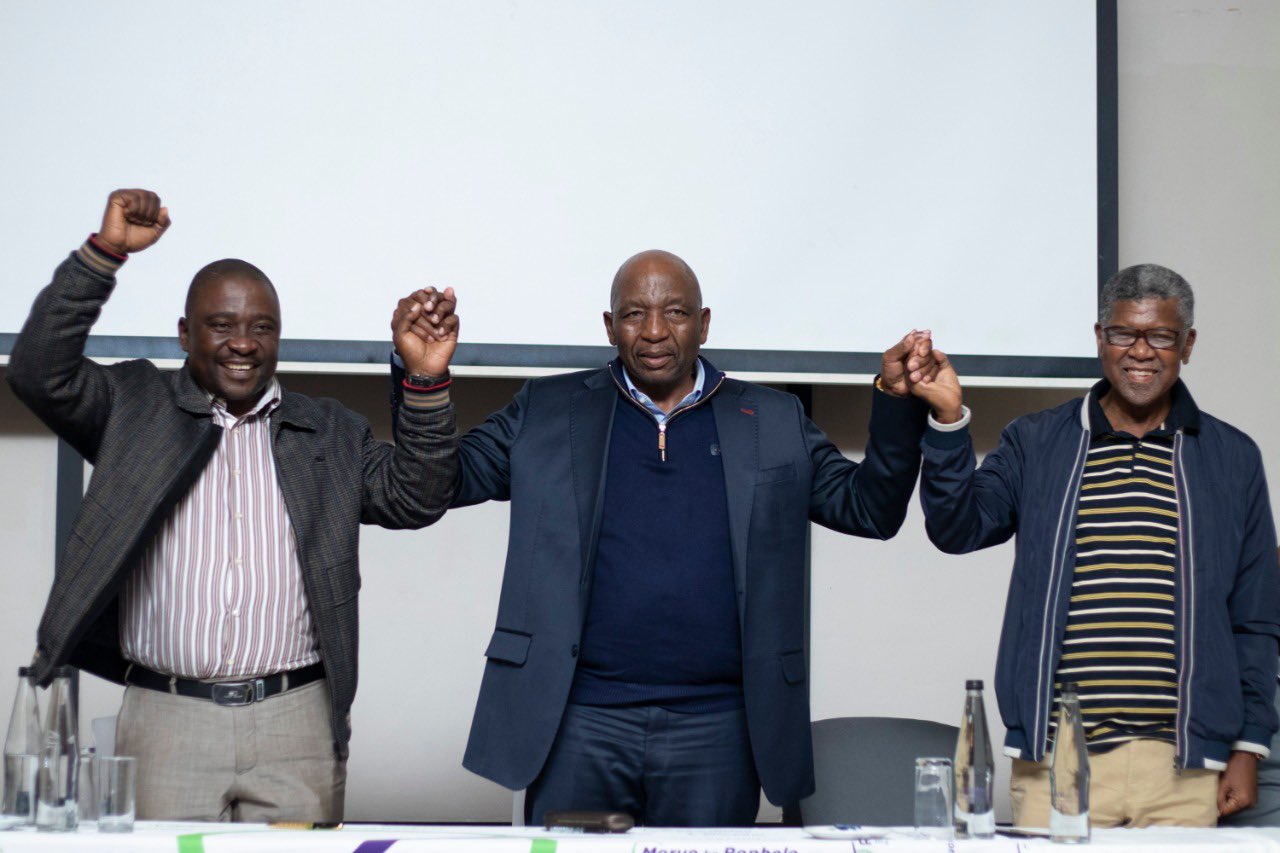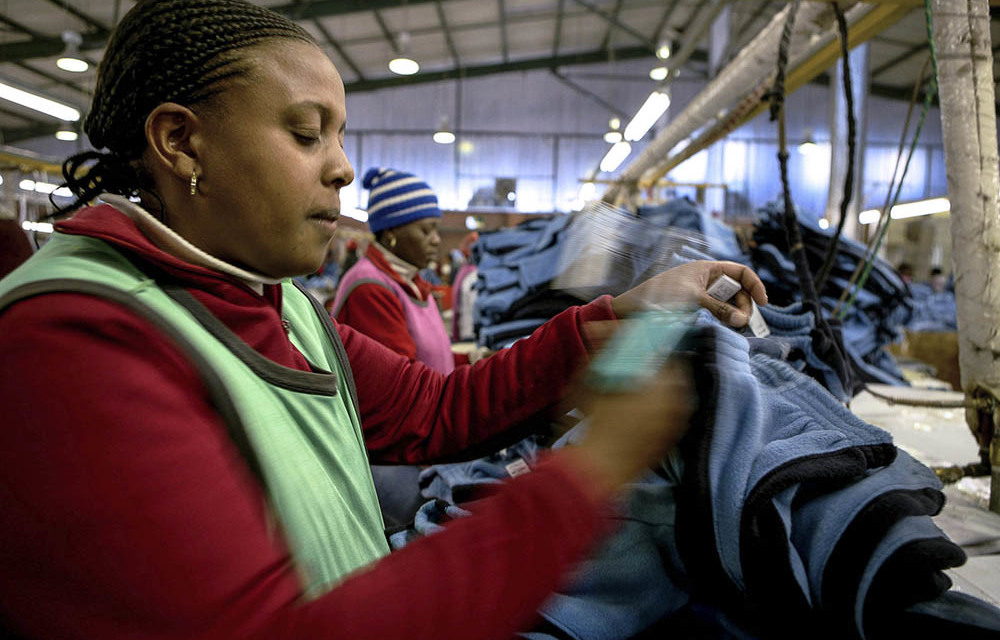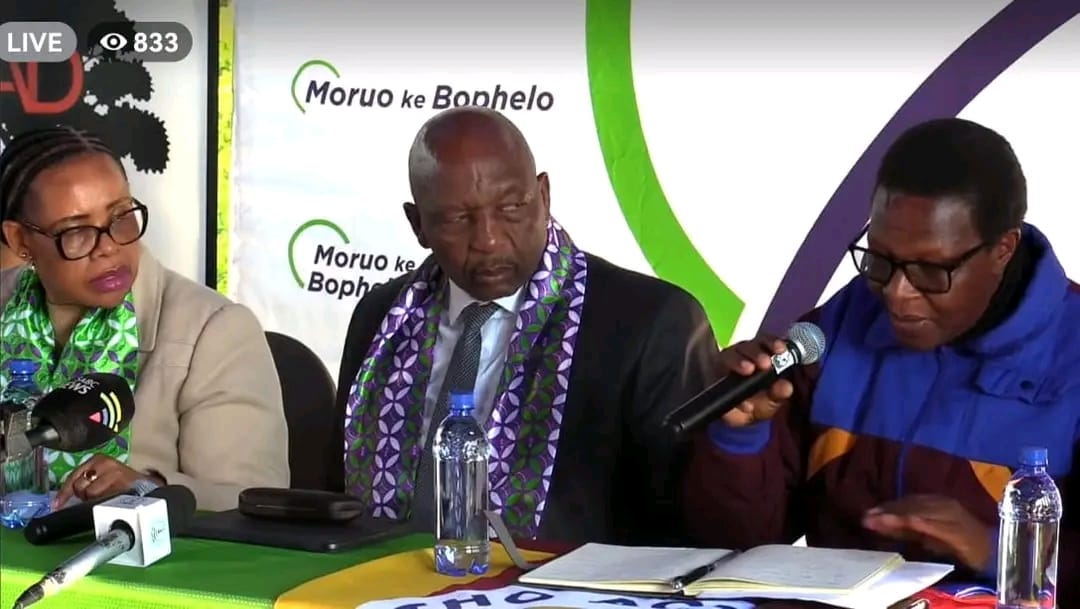When the centre cannot hold, spells disaster for government and governance:
The case of the RFP-led Coalition Government - inability to defuse internal conflict within coalition partners, faction-ridden party leading a fragmented alliance and this spilling to parliament and government

Dr Tlohang Letsie
Senior Lecturer in the Department of Political and Administrative Studies at the National University of Lesotho

Trouble amid high expectations
Since coming into office after the national elections held in October 2022, the three-party coalition government consisting of the RFP, Movement for Economic Change (MEC) and the Alliance of Democrats (AD) has hardly realised stability necessary to steer Lesotho forward and ‘free the country from clutches of poverty and hopelessness’ as promised by Prime Minister Samuel Matekane upon formation of the RFP. Prime Minister Matekane had promised that his government would slowly, but surely cure the social ills plaguing the Basotho nation and would ensure that every Mosotho enjoyed their freedoms. He had promised that his government would ensure that Basotho equally shared in the social and economic amenities of the country. This gave a modicum of hope as it was couched on the revolutionary perspective as the RFP was characterized to be ahead of elections.
To-date, this promise just remains a mantra and a mere pipe-dream as it has not been achieved. This could be aptly attributed to the instability within the leading party and its coalition partners, which are equally conflict-torn and their members feel disenfranchised. While there is a remarkable challenge from opposition, as it would be expected, but internal defiance played a major role. Another shortfall is that the party has, for a long time, been run by an ‘interim committee’ that has failed to establish critical party structures necessary for the proper functioning of a political party. When interim structures adopted at inception of the party are not turned into substantive structures and remain interim for too long, they create discomfort from the members, whose sense of belonging is undermined.
They feel the party to which they subscribe their membership is taking them for a ride when in fact; it has its own core people. It could be assumed that the party’s politburo’s reason for not calling an Annual General Conference (AGM) was based on the notion of stabilizing the party, particularly during the inception stages, which are mostly fragile. It was only at its infancy stages, and the interim structures sere intended to take the party to elections. Maybe the politburo felt it could easily descend into conflict if it hastened to go for AGMs, which have indeed caused damaged to many old parties. However, the inverse has been the case for the RFP, which is swimming in a pool of internal strife.
Dissatisfied members have made incessant, but unheeded calls for the staging of an AGM to elect a substantive National Executive Committee (NEC). The dissatisfied members even sought the intervention of the courts by lodging a court case to demand a Conference, but it has not seen light of day. To-date, the RFP is deeply torn right from the top downwards. Calls for a Conference came from members who have defected from other parties to join the RFP, whom annual a conference is a tradition. Suspicion is that the RFP’s reasons for not holding a Conference are only known to the party’s, which in the members’ perspective might be that it was undemocratic as the tradition is that a democratic party must frequently go for members’ conference for election of a new leadership of the party.
It might have been in the disgruntled members’ perspective that the running and management of political parties is universal to the extent that the RFP could not deviate from that norm. Without clarity and constant communication from the leadership, that still remains undemocratic in the members’ perspective,and the public’s perception would be that way. This is one area where the RFP falls short - effective communication to its members. This even spills to the Government it leads, poor communication of the plans and strategies that the party is implementing. The party easily creates room for negative perceptions and suspicions of dubious intentions when its communications architecture is poor.
As it could be expected under such circumstances, the consequence of the RFP’s instability has filtered into Parliament and Government. In parliament, three party Members of Parliament (MPs) have aligned forces with the opposition and voted against their own Government. This is indicative of a centre (RFP), which cannot hold at party level and its own foot soldiers doubting its ability to deliver. Interestingly, one of the three – Thuso Makhalanyane - is the party’s Chief Whip, whose function is to ensure that the party’s legislators attend and vote on legislation according to the party’s leadership dictation. If a Chief Whip of a party in parliament, a critical position like that one, goes a different direction from that of the national executive of the party, it spells disaster for the party. The influence that the person holding the position has on the MPs is critical, and the possibility that he could sway a great chunk of party MPs to his fold and they could easily follow him cannot be downplayed.
People holding such critical positions need to read from the same hymn book with the executive of the party so that they are in fact vehicles for search for buy-in from the rest of the members, particularly in parliament where stability is of utmost importance. However, it cannot be ruled out that the Chief Whip could be among the party members who want to bring other parties’ traditions to the RFP, and failing to toe the line set by the executive of the party. However, though a political party culture differs from party-to-party based on ideology, it can be established across the political spectrum.
For a country as small as Lesotho, cultural diversity across all sectors of society is not feasible as people easily identify with small cultures and may be tempted to adopt them to every situation. The trio that defied the RFP leadership was initially suspended and has since been dismissed from the party. The dismissals have exposed the weak conflict resolution and trouble-busting mechanisms within the party. This also cast a dull shadow on the RFP, which has just joined the political field, and for it to expel members, signals a high degree of intolerance of dissent among for the eadership of the party. Irrespective of the rationale of the decisions to take such harsh measures intended to maintain party discipline, it casts a negative perception against the party and has the potential to scare future prospective members to join the party.
Basotho have become livid about the fractious and fragmented character of the politics, especially within political parties. This is partly the reason they flip-flop form one party to another in search of new political homes. If a new party adopts stern measures against deviation, it quickly paints a picture that ‘it is just like all other parties,’ faction-ridden.
Meritocracy at the primaries misconstrued as discrimination
Noble as it appeared, the principles of meritocracy through the screening of candidates came to haunt the party when many politicians left their already established parties and joined the newly-formed RFP. There cannot be a price for guessing that these politicians wanted to capitalise on the potential the new party was showing and use it to attain power that they were not able to attain through their parties. Commenting on the RFP’s screening process, renowned local journalist Bongiwe Zihlangu and ‘Marafaele Mohloboli opined that ‘although controversial, the decisions to select the 10 unopposed candidates and thoroughly vet the remaining ones could actually save the party from chancers.
Lesotho’s politics are notorious for opportunists who often defect to other parties as soon as they sense an opportunity to further their own interests’ Implementation of the merit-based system was such that candidates in the remaining constituencies would nonetheless have to undergo primary elections, in addition to fulfilling other rigorous criteria including checks on their educational backgrounds and interviews. These checks were intended to assess the candidates’ fitness to represent the party. According to the party hierarchy, all the screening processes were made in line with the principle of ensuring that most suitable candidates occupied positions in the party and possibly later in government.
It was critical that the RFP established internal party norms in collaboration with membership and frequently communicated its ideological underpinnings. The party had a responsibility to teach its members about the distinctive party norms so that they are not confused. The party’s politburo should have communicated its uniqueness to the membership and make them fully appreciate how it differed from the rest of the parties. This would include the party’s decision to use direct tickets for other members and the unique practice of conducting interviews after holding primaries to determine the preferred candidate.
Members, who have defected from other parties to join the RFP, are used to a tradition where the views of the voters in the primaries to be the final decisions. They are a determinant of the choice of who the people want to represent them in elections. If that was laid out as a party tradition and effectively communicated to members, and even provided for in the party constitution, the courts of law would not go against a clearly set out party tradition when faced with petitions of this nature.
What makes the RFP fail to keep its house in order?
The problems of the RFP are structural and are as old as the party itself. There is perception that the party was formed as a Matekane-led project whose objective was not clear-cut from the outset, hence leading to the suspicion that it was intended to protect the founders’ business interests from the surge by politicians who appeared hell-bent to create their own business moguls at the expense of Matekane and his colleagues. On a positive note, the RFP has ‘revolutionized’ Lesotho politics by deviating from conventional political practices that have bedeviled Lesotho nascent politics. For instance, the RFP introduced a direct ticket for certain trusted MPs, during the run-up to the 2022 national elections, a system that saw Matekane and other ten founding members automatically representing the party in their respective constituencies without being subjected to primaries. This is a tradition in all other parties and as a result of its being a new phenomenon; it was rejected as being undemocratic.
This opinion could not more correct. It is now common knowledge that the party went through legal processes that saw some of the candidates that the party had rejected become party’s candidates through court orders. Two of the three recently expelled MPs were part of this group. The implication of these court battles was that the party was now consisting of two powerful factions with each aiming to capture power. This created mistrust within the party as some of the MPs that represented the party through court orders were seasoned politicians who had tasted power before, the likes of Dr Mahali Phamotse, who has been at the helm of party leadership from the previous parties to which she belonged.
On the other hand, the founding faction remained adamant and had a negative attitude towards the so-called ‘court-order MPs’ as no serious reconciliatory measures were put in place.
The implication of the RFP’s factional set-up on governance
While the RFP staged a dramatic performance and won 57 of the 120 National Assembly seats, it still needed the assistance of the AD and MEC to acquire the constitutional requirement of 50+1 percent to form government in parliament. With the support of other smaller parties, the Government side had 74 seats overall. Unlike in the post-2012 elections coalition, where problems emanated from disagreements between the coalescing parties, the troubles of the RFP-led coalition solely emanated from internal jostling for power within the leading party. Internal wrangling is more dangerous than external challenge to the party. It weakens the party to the core as outsiders take advantage of the internal rifts and widen them further.
Factionalism within the RFP has led to even the noble initiatives to be described in factional lines. For instance, the reduction of the cabinet size was deemed by some critics as a measure meant to deny ‘court order’ MPs ministerial positions. Incidentally, ministerial positions are the ultimate aim of opportunistic Lesotho politicians due to the lucrative benefits that they carry. It is thus not difficult to infer that the now dismissed MPs were putting the party under pressure with the hope of being silenced with ministerial positions. As earlier indicated, this noble goal of cutting public spending through reduction of the historically overblown cabinet and other strategic positions could have been well communicated across all party structures. This would have ensured that it got ownership of the members and be ratified by all structures. It could have not caused the row that it did.
The factionalism therefore preoccupied the ruling party to the extent that if affected national service delivery. With this fragile situation, the party found unable to reign in those dissatisfied MPs, who had gone amok. The party could not reprimand ministers even when they went astray in fear of losing support in the National Assembly due to the delicate stage it had come.
Any sense of direction in RFP-led government navigation?
The RFP-led Government has demonstrated weakness in determining its policy direction. The Government has hardly put up any concrete policy plan on how it plans to take the country forward regarding economic development. This weakness has been compounded by the government’s limited communication. Despite having the substantive spokesperson, the government rarely communicates its plans and vision. In the rare cases it does, it is usually in reaction to the some (mis)information that has been peddled by opposition parties. The Government’s silence on the continuing loss of jobs in the textile industry is a case in point. It is noteworthy, however, that despite the above-mentioned limitations, the government has managed to perform extraordinarily well in some cases.
The good maize harvest recently realised in many parts of the country has once again brought hope of food security within the country. The same enthusiasm can be said about the rehabilitation of the country’s road network as well the new signs of life shown by the Directorate of Corruption and Economic Offences (DCEO) following its increased budget and the recruitment of an experienced Director-General of the statutory body, who has gathered vast experience from South Africa.
While the said successes are clouded by secrecy and controversies, they have ushered a ray of hope to people on the ground. This is what matters most as democracy has to be results-oriented. The enthusiasm (despite the secrecy and controversies) can be explained in terms of what some scholars of democracy have termed ‘substance democracy’ in which the system is taken to be democratic on the basis of its positive results and not necessarily the processes leading to such outcomes. It is evident that with less internal squabbles within the leading party and more focus on communication of policy direction, the RFP-led government would possibly deliver on some of its promises.
Is the end of the road in sight for the RFP-led government?
Recent episodes have seen threats of dislodging the RFP-led government through a vote of no confidence by opposition parties, who worked in cahoots with the now expelled RFP MPs. This has cast doubts on the Government’s ability to hold on grip and whether it would fall on its own sword before the 2027 election. In what is believed to be a delaying tactic, the RFP-led government delayed the re-opening of Parliament by more than a month, leading to the opposition parties threatening to sue the Prime Minister to force him to open parliament.
There is no doubt the instability within the RFP has created the uncertainty that threatens the Government’s very existence. However, in the final analysis, it appears that the greater chances, at least until now, are that the vote of no confidence, if passed, is unlikely to succeed. This is given the strategic position the Government stood - that of incumbency, which presents it with a wider room within which to maneuver. It has now roped in the Basotho Action Party (BAP) and promising it Government posts. The failure of the no-confidence motion also rested on the character of the forces calling for it, which it has been shown, were not a united force from the beginning. Opportunistic tendencies within the same opposition bloc have been
its undoing and made it easier for the ruling side to penetrate and dismantle.
Most importantly, disagreements over Matekane’s potential successor are likely to be an obstacle to the aspirations of dislodging Matekane. This is likely to breathe life into the ailing RFP-led government and keep it in office for a longer period.
Most Read
New coalition government-in-waiting unveiled

The cooling of the political temperatures came with the BAP joining the bandwagon after a season of political agitation and chess games, reflecting political anomalies in the system of political governance of Lesotho:

A Comprehensive Analysis of Lesotho's Textiles and Garment Sector

Related Stories
Opinion Vote Polls
Do you think the existing government is going in the right direction to benefit the people of the country?
Subscribe for your daily newsletters
Enter your email to subscribe to our newsletter.

